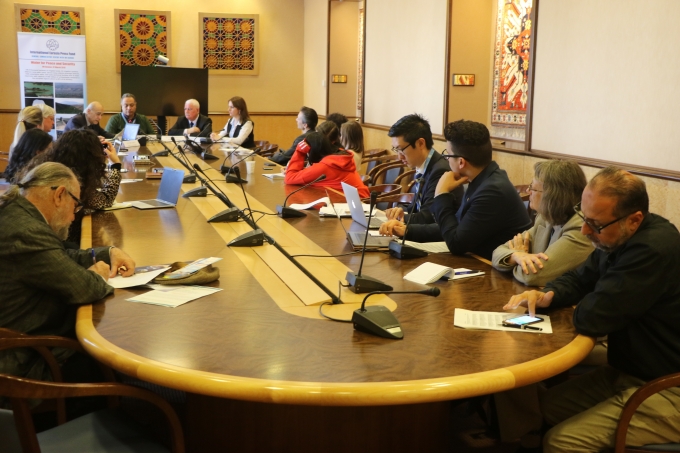On March 7, the International Eurasia Press Fund (IEPF) held an event "Water for Peace and Security" in partnership with the Global Institute for Water, Environment and Health (GIWEH) within the 40th Session of the Human Rights Council in Geneva.
IEPF President Umud Mirzayev said that the world is facing serious environmental problems as a result of religious, ethnic conflicts and terrorist acts. The wars created socio-economic disasters in more than 50 countries around the globe. 65 million of people became refugees and IDPs.
"For more than 30 years, Azerbaijan has suffered from the occupation. More than 20 percent of our territories have been occupied by Armenia and more than a million of people became refugees and IDPs. Moreover, since 1992, the Sarsang water reservoir, have been occupied by Armenian armed forces. The water is being used as a political and economic influence against our country. For this reason, thousands of people suffer from water scarcity in the frontline regions of the country."
He called for the liberation of the occupied territories, for the protection of human rights and for the creation of a sustainable environment, peace in the region, and sustainable development. He called on civil society organizations, refugees and internally displaced persons, human rights defenders to unite the efforts, to return people to their native lands, to maintain peace.
Later, the water problems faced by Azerbaijan were presented in the film "Water is a War Machine" prepared by the IEPF. The documentary film has caused serious interest of the audience.
Another speaker, Nidal Salim, head of the Global Institute for Water, Environment and Health urged Armenia to stop using water as pressure on Azerbaijan and to adhere to international legal instruments adopted in this area.
"Today, falsely made water problems in different parts of the world have brought a stain on humanity."
Member of Office of the United Nations High Commissioner for Human Rights Prof. Osman El Hajje spoke about the protection of water resources, as well as about international legal norms. He called the act of using water as pressure on Azerbaijan as an international crime.
Anastasia Lavrina, Assistant to the President of the IEPF, spoke about the water problems and environmental crime on the occupied territories of Azerbaijan. She said that destruction of water infrastructure on the occupied territories of Azerbaijan and non-humanitarian use of water on the uncontrolled areas is inadmissible. The UN entities were called to pay more attention to this issue and prevent it to happen.
In the end, Ramil Azizov, Vice-President of the IEPF, answered the questions of participants. He spoke about the water as it is being used for political purposes. He also talked about human rights and security issues.
The event was held in the Azerbaijani room of the UN Office in Geneva, which is decorated with national ornaments. About 30 civil society representatives, representatives of international organizations and the mission's representatives attended the event.


